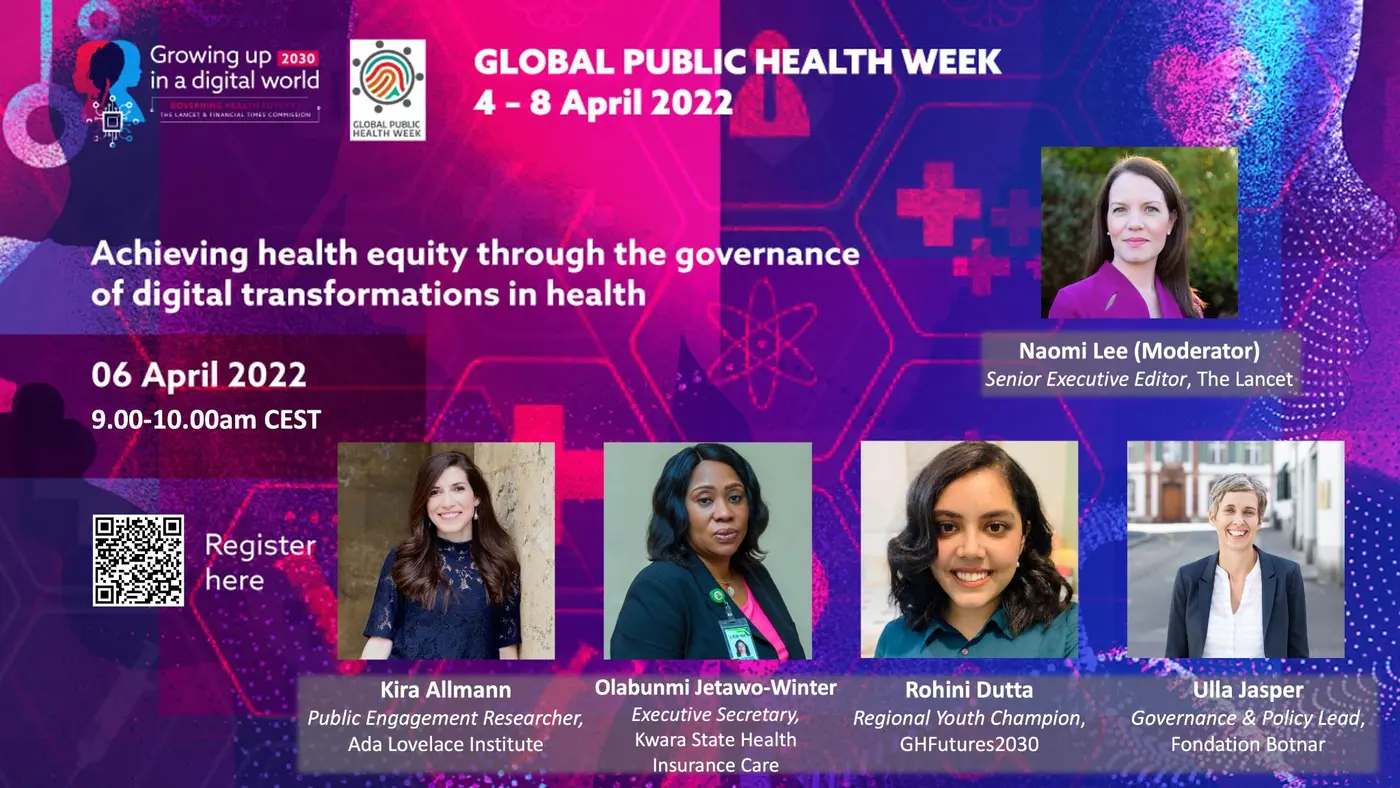This all-women panel—with equal representation from high and low-middle income countries—included panellists: Kira Allmann, Public Engagement Researcher at the Ada Lovelace Institute; Rohini Dutta, Global Surgery Fellow at the WHO Collaborating Centre for Research in Surgical Care Delivery in Low-Middle-Income Countries and GHFutures2030 Regional Youth Champion; Olabunmi Jetawo-Winter, Executive Secretary at Kwara State Health Insurance Care in Nigeria; and Ulla Jasper, Governance and Policy Lead at Fondation Botnar. The lively discussion was moderated by Naomi Lee, Senior Executive Editor of The Lancet. The panel convened diverse perspectives on the meaningful governance of digital transformations that can decrease existing inequities within healthcare.
The Governing health futures 2030 report calls for a solidarity-based approach to health data and poses that such an approach is a defining feature in maximising the public health value of digital transformations. Furthermore, when the governance of digital transformations is embedded in value-based principles such as data solidarity, digital trust, accountability, and public participation, health equity is better supported.
“Ensuring governance frameworks that break the asymmetric power imbalance cross-continentally and are centred in a human rights-based approach is necessary”, said Dutta.
Inequities that largely affect women, young people, children and minority communities have the greatest potential for widening the digital divide and impacting future generations. Current inequitable landscapes will only be further exacerbated by the introduction of digital technologies.
“Equity means carrying everyone along and making sure the services provided are truly available to all and not benefitting only a section of the society,” said Jetawo-Winter.
Olabunmi Jetawo-Winter discussed care in Nigeria and the importance of taking into account barriers to accessing healthcare services. With 40% of the state’s population living below the poverty line, coupled with the geographical terrain and the lack of smartphone ownership, inequities are often exacerbated in accessing healthcare. One solution discussed was the inclusion of gatekeepers to disseminate information locally to overcome these barriers to knowledge and access.
“One of the key focus areas in addressing health equity in digital transformations is addressing knowledge equity which requires the inclusion of diverse perspectives to form participatory and egalitarian structures for managing data in the long-term which will serve to enhance public trust in digital technologies,” said Allmann.
At the Ada Lovelace Institute, a lot of research is done on healthcare, data-driven systems and downstream impacts on health outcomes in order to bring barriers to the surface—from the systemic barriers to people’s lived experiences. This helps policymakers to understand how they can address these inequalities.
“Progress towards SDG 3 can be accelerated through the incorporation of digital technologies and artificial intelligence in healthcare. This will help us bridge the healthcare delivery gap,” added Ulla Jasper.
However, technical barriers such as digital inoperability impede such progress. Many solutions are piloted but seldom reach scalability. This is unfortunately seen in cases of donor-driven efforts that don’t take into account the needs of the local populations.
Furthermore, the political structural divide that hinders access to healthcare for communities is something that requires focus. There is a need to bridge the gap in health care delivery, address questions around the governance of technologies, and increase financial investment. Fondation Botnar supports GHFutures2030 Commission’s efforts. The next steps will be to focus on creating a global society movement to really get governments to see the recommendations of the report and take them into consideration.
The Commission’s report highlights that enfranchised communities and public participation are crucial for citizens to co-design future health governance.
“The inclusion of young people in the Commission’s work was necessary to ensure their ideas were captured to jointly conceptualise the future of health, said moderator, Naomi Lee.
The GHFutures2030 Youth Statement and Call for Action, the partnering document to the Commission report, was developed by thirty-five youth from twenty-one countries and ultimately informed the Commission’s deliberations. Youth called for strong and inclusive health governance; a human rights-based approach to health; and the need to foster digital skills, education, and innovation for health futures.
“As a young person myself, I believe that our lived experiences, along with our own skills, make us experts in our own rights. This must be both recognised, valued, and leveraged through collaboration across sectors to amplify our voices for greater civic and political engagement, participatory research, and to improve the effectiveness and implementation of health interventions in order to safeguard health futures,” said Dutta.
Rohini Dutta is a medical graduate from Christian Medical College, Ludhiana, India; Global Surgery Fellow at the WHO Collaborating Centre for Research in Surgical Care Delivery in Low-Middle-Income Countries India and GHFutures2030 Regional Youth Champion.
-
This author does not have any more posts.


